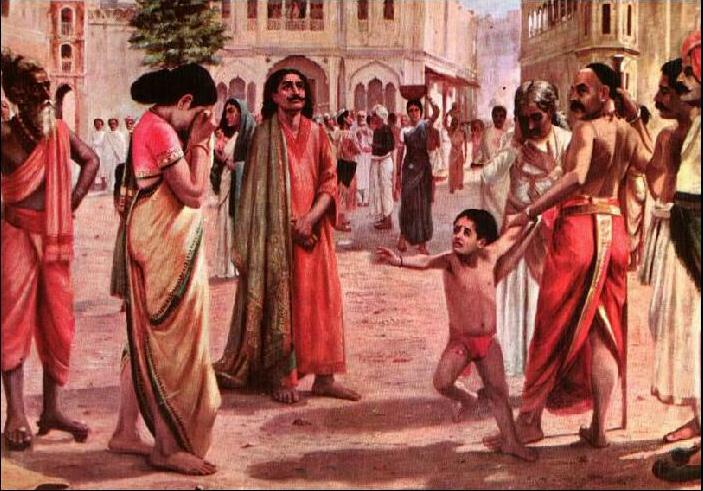Shaivya (wife of Harishchandra)
 Shaivya (, also spelt Shaibya), also known as Taramati (), is a queen in Hindu mythology, best known as the wife of King Harishchandra of Ayodhya and mother of his sole heir, Rohitashva. Her story particularly appears in the Sanskrit texts ''Markandeya Purana'' and ''Devi Bhagvata Purana'', where she is portrayed as a loyal and long-suffering queen who endures severe hardships alongside her husband during his divinely orchestrated trials by the wrathful sage, Vishvamitra.
Shaivya (, also spelt Shaibya), also known as Taramati (), is a queen in Hindu mythology, best known as the wife of King Harishchandra of Ayodhya and mother of his sole heir, Rohitashva. Her story particularly appears in the Sanskrit texts ''Markandeya Purana'' and ''Devi Bhagvata Purana'', where she is portrayed as a loyal and long-suffering queen who endures severe hardships alongside her husband during his divinely orchestrated trials by the wrathful sage, Vishvamitra.According to the legend, when her husband, King Harishchandra, incurs the wrath of the sage Vishvamitra and is compelled to relinquish his kingdom and wealth, Shaivya remains by his side as they descend into poverty. When Vishvamitra demands further offerings, it is Shaivya who proposes selling herself to a wealthy Brahmin so that her husband can fulfill the sage’s demands. She endures severe hardship, including verbal abuse and physical mistreatment during her servitude. Her trials reach a climax when her son dies from a snake bite. In a state of grief and dishevelment, Shaivya unknowingly approaches her husband—now employed as a crematorium attendant—to seek permission for the funeral rites. Bound by his duties, he refuses to proceed without the required payment. They bewail their misfortunes and decide to immolate themselves on their son’s funeral pile. Ultimately, the gods and Vishvamitra—who have been testing the couple’s virtue—are moved by their unwavering moral integrity, and Shaivya and her family are restored to honor and granted entry into heaven.
In Marathi devotional literature, particularly the Vārkarī interpretations of Harishchandra narratives, Shaivya is known as Taramati, a name that gained enduring popularity in western India and later in modern period. These narratives elevated her role, emphasizing her spiritual strength, endurance, and unwavering virtue, often paralleling her trials with devotional ideals of sattva (goodness) and bhakti (devotion). Shaivya remains a popular tragic heroine in Indian cultural memory and features prominently in numerous adaptations of the Harishchandra legend, including ''Raja Harishchandra'' (1913), India’s first full-length feature film. Provided by Wikipedia

